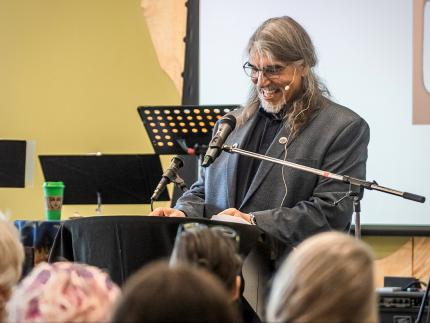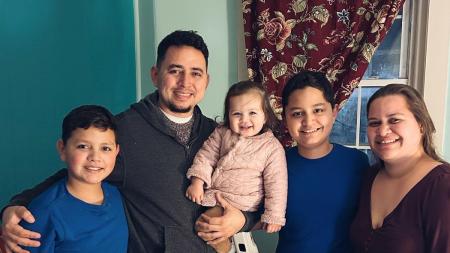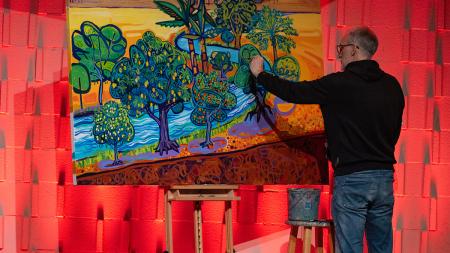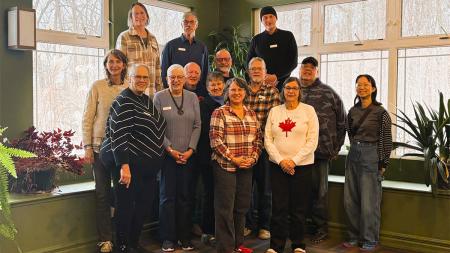A Journey to the Heart

“To meet on the level of exchanging hearts is where the gospel lives,” said Rev. Dr. Raymond Aldred during the Friday-morning session of the May 25-28, 2023, Canadian National Gathering. “This is where Jesus is found. Not on the level of the mind or of religious institutional purity, but on the level where humans live their real lives – the level of human suffering, the level of the heart.”
Aldred, who is Cree and whose mother was born on the territory of the Swan River Band in Treaty 8, is the director of the Indigenous Studies Program at the Vancouver School of Theology. He was also ordained in the Christian and Missionary Alliance in Canada and is now ordained in the Anglican Church of Canada.
Aldred was invited to speak to the 160 Christian Reformed people at the Canadian National Gathering about the topic of theology in the 21st century. This, he said, requires a shift in mindset from a spirituality that is based on technique and intellectual know-how to a spirituality that is focused on the language of the heart, emotions, and the real world.
He said that the church had taught him not to feel. Even in seminary, the teaching prioritized facts, then faith, he said. And only after those two things were sorted could you deal with feelings.
“It was all about learning proper methods, proper strategies, and proper techniques that would make you productive at ministry,” Aldred added. “The solution to every problem was to think better.”
However, when Aldred began his ministry and attempted to apply this theology of creeds, confessions, and institutes to the Indigenous church, he found that it didn’t match up to reality. Sometimes, thinking better and explaining how things ought to be were not sufficient to respond to the pain, injustice, and ongoing trauma that people experience, he said.
To help explain his point, Aldred shared a story from his own past. When he was newly ordained in the Christian and Missionary Alliance church, Aldred pastored a congregation and provided oversight to several other churches in the region. He also went back to school to earn a master’s degree. That kept him very busy, he said.
At a couples retreat later, Aldred and his wife, Elaine, were asked to write letters to each other explaining what they first loved about each other when they met. Elaine’s letter ended with “But, to be honest, I don’t like much of anything about you anymore.”
The long hours, time apart, and lack of time for the family were placing stress on their marriage and causing Elaine pain.
“I spent the next two hours trying to convince her that she didn’t really feel that way,” said Aldred, which, he joked, did not go over well. “I realized that that’s what the church does to people who say they are hurting. We try to convince them that it is really their fault, that they don’t really understand the situation, or they need to look at it in a different way.”
It wasn’t until hours later that Aldred came to realize that he, like his wife, didn’t like himself very much anymore either.
“What was key to the whole thing was being able to listen to my heart, and being willing to feel. I had to learn how to do that,” he explained.
In the same way, he said, Christians in church ministry need to develop emotional intelligence.
“Your feelings are not trying to hurt you. They are trying to help you, if you would just listen to what they are saying,” Aldred said.
For Indigenous Christians, this means coming to terms with their trauma and pain. Society and the dominant church have told lies to Indigenous people for generations that tell them they are not good, not good enough, don’t belong, aren’t lovable, and shouldn’t exist. Indigenous people have often internalized these lies, and it has resulted in self-hatred and contempt, leading to a whole host of societal and personal issues.
Non-Indigenous Christians also need to learn to touch the pain in the center of their souls. Quoting Henri Nouwen, Aldred said that the church has forgotten that “it is not our ability to think but our ability to love” that is most important.
“We can not think our way out of this,” Aldred said. Instead, he said, we need to embrace the pain, and then also recognize the value we all have as imagebearers of God.
Next, Aldred said that we all need to tell the truth.
“Things change when you tell the truth,” he explained. Things changed in Canada when Indigenous people began to file lawsuits against churches and the government. Only after these Indigenous people told their stories did religious and political leaders step up to acknowledge the wrongdoings of the past and commit to doing better.
In addition to telling the truth, Aldred said, we need to listen to each other and come heart-to-heart. This is where healing and reconciliation can take place.
“If you do not learn to listen and feel the pain that you have caused, then you cannot be transformed. That is why your partner gives you a gift when they tell you how much your actions hurt them. Unless you feel, you will not have the emotional resources to change,” he said. “But it is not easy, so you have to learn to listen.”
Aldred also explained that we need to have a shared plan. This is where we are today. We continue to tell the truth. We continue to have opportunities to listen, but we need to come heart to heart and come up with a plan.
“We need to shift away from thinking about holiness and salvation apart from creation and understand that holiness, wholeness, and salvation are about finishing the creative work of God,” he said.
Aldred explained that Irenaeus and the Indigenous creation story point out that creation was made good but immature, and that sin bent every relationship. Jesus Christ came to set things back on the path of creation.
“Reconciliation is the coming together of all things – when Creator and creation meet in the perfect harmony that we see in the person of Jesus Christ – fully God, fully human; creation, Creator; perfect harmony. This is the goal and purpose of creation. To see all things reconciled,” he said.
Aldred acknowledged that there will be challenges on the journey. Indigenous people are crying out for relief from the pain of exploitation of generational trauma, and the pain that tells them they are not enough. This pain makes it difficult, but not impossible, for us to come back together.
Still, he concluded, we need to be willing to try: “I offer to you the feelings I have in my heart. I put them on my sleeve and I hold them out to you as we continue on this journey of reconciliation.”
The Canadian National Gathering was held May 25-28, 2023 on the campus of Algonquin College in Ottawa, Ontario. This is the second in a series of stories about the event. Additional stories will be shared in the coming weeks.


